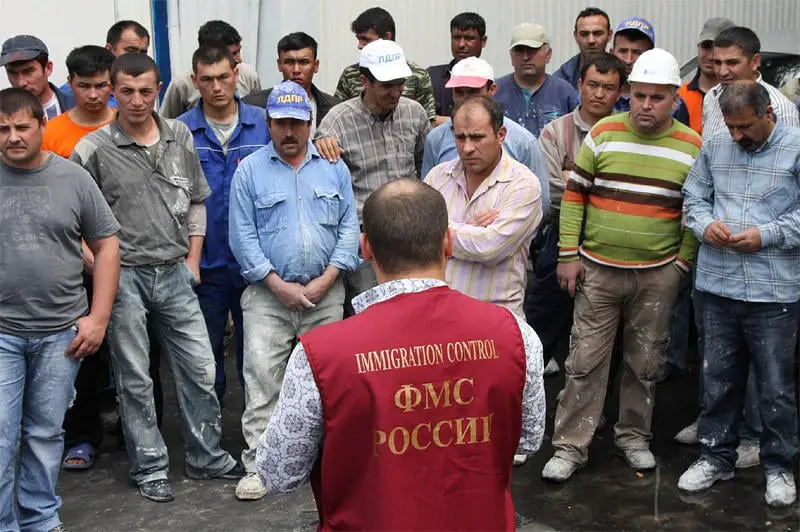The following is lesson 1 of the Моя Россия advanced Russian lesson series. Note that all bold words and phrases have annotation below. Red words and phrases indicate the subject of this blog entry’s grammar lesson. Asterisks indicate slang.
Меня зовут Роксана. Мне 23 года, и уже много лет я живу в Москве. Большую часть жизни я прожила в этом городе, хотя родилась я совершенно в другом месте.
Родом я из Душанбе. Душанбе – это столица Республики Таджикистан, входившей когда-то в состав СССР. Республика Таджикистан (или просто – Таджикистан) получила независимость в 1991 году, буквально незадолго до моего рождения. Когда практически сразу же в Таджикистане началась гражданская война, и находиться там стало небезопасно, моя мама сбежала со мной в Москву.
На самом деле это ничем не примечательная история, ведь таких, как мы, очень много: покинувших свои дома в поисках лучшей доли. Если не война, то плохие условия жизни и жажда обеспечить себя и свою семью гонят людей с территории всего бывшего СССР (и не только) в Россию, а в частности в Москву. В Москве живет почти 12 миллионов человек, и очень многие из этих людей никогда в жизни не назовут себя этническими русскими. Вы можете не отличить их внешне, ведь многие из них не выглядят как-то иначе, а русским языком владеют в совершенстве. Для всех этих людей Москва стала своего рода вторым домом, ведь возвращаться домой зачастую не хочется, невозможно, а иногда и небезопасно. Вот и получается, что Москва – интернациональный город.
Среди нерусского населения, кроме хорошо адаптированных, уже совсем москвичей есть еще и гораздо менее адаптированные приезжие и гости. Одни из них находятся в городе на ПМЖ, а другие – трудовые мигранты. Таких людей отличить очень легко, а если вы хотите пообщаться с разношерстным приезжим населением столицы, то у меня один совет: идите на ближайший рынок. Самые яркие и интересные представители нерусской Москвы работают именно там, это их территория.

Однако рынки – это не единственный пример многонациональности Москвы, ведь, если говорить о менее заметных жителях столицы с нерусскими корнями, то они встречаются везде. В офисах, где они занимают самые разные должности, в магазинах, где они работают продавцами и кассирами, в службе такси. Чаще всего русские москвичи даже не замечают этих людей, но те сами они интуитивно чувствуют друг друга, осторожно спрашивают, а если их собеседник и правда земляк (или даже не земляк, но просто тоже когда-то иммигрировал в страну и город), то крепкая дружба завязывается немедленно.
Но не стоит думать, что русские совершенно слепы и глухи. Если русский москвич умный, он знает, что с такими людьми нужно дружить, ведь что может быть приятнее, чем хороший знакомый на рынке, который продаст тебе самый вкусный и свежий продукт? Что может быть замечательнее, чем добрый дедушка-таксист, который готов подвезти тебя в любое время дня и ночи, стоит тебе только позвонить ему? Приезжими любая дружба ценится, не только со своими собратьями, но и с теми, к кому они приехали жить.
Я пытаюсь сказать, что, хотя в Москве и встречаются очень серьезные ксенофобские конфликты и атаки, этот город не сможет существовать и функционировать нормально, если в один прекрасный день убрать из него всех тех, кто не является этническим русским. Россиянин он или нет – это не важно, ему все равно найдется здесь место. И хоть Москву зовут «нерезиновой»*, она вполне себе способна вместить и подружить людей с очень разными корнями, с чем она вполне успешно справляется!
Vocabulary and Cultural Annotations
Лучшая доля – can be translated directly as “better fate” but would be contextually  rendered as “a better life.” “Доля” has many meanings: 1. part, portion, share, quota; 2. lot, fate. In this case it’s translated as “fate” or “lot.” “Лучшая доля” is an idiom that has to be remembered.
rendered as “a better life.” “Доля” has many meanings: 1. part, portion, share, quota; 2. lot, fate. In this case it’s translated as “fate” or “lot.” “Лучшая доля” is an idiom that has to be remembered.
Этнический русский – Ethnic Russian. While in English both “русский” and “российский” are translated as “Russian,” in the Russian language they are two different words:
– “Русский” comes from the root “рус” (ie.: Русь, Киевская Русь) it means something belonging to an ethnic group (ie.: русские традиции, русские песни, русский язык).
– “Российский” comes from the word “Россия,” its root is “росс” (ie: россияне) and means something belonging to a nation, state, country (ie: российские подводные лодки, российские граждане, российский президент)
– The difference is very important as there are Russians (русские) in Russia but not all Russians (россияне) are Russians (русские).
Зачастую – often, frequently.
ПМЖ (постоянное место жительства) – permanent residence, place of residence. This is a legal term in Russia. One’s permanent residence should be registered with the government.
Рынок – market place. It’s very similar to a bazar (or, in the American understanding, a farmers market) but in Russia people don’t call it bazar (базар), they call it рынок. The distinction is important as mostly immigrants from Central Asia of not very high social standing in Russia use the word базар and Russian people don’t generally like the word to refer to local places. For Russians, a базар is something much more exotic – and generally located in an Eastern or Asian country.
Земляк – fellow countryman, compatriot, brother (by place of birth). Its root is земл (ie: земля: earth, location, place). A synonym for “земляк” is “собрат.”
Собрат – in this case it’s the same as земляк. Its root is брат (brother). Can also be used for members of the same brotherhood/fraternity/group of people connected with one ideology.
Россиянин – Russian (means “belonging to Russia as a country,” and refers to something which is part of the Russian Federation or a citizen of Russia). Do not confuse with русский (which is also translated as “Russian” but which specifically means “ethnic Russian”).
Нерезиновая* – Moscow. Comes from the phrase: “Москва не резиновая” (“резиновый” translates as “elastic,” “rubber,” не резиновый – not elastic). “Нерезиновая” is a slang name for Moscow: many immigrants and many people from different Russian provinces want to or do move to Moscow as most feel that it represents the best chance of economic advancement within Russia and even within the Russian-speaking world. This has resulted in a quickly growing and rapidly diversifying population. As is often the case in societies where this happens, there has been resistance to migrants by many locals. Muscovites who are against such a population growth say that their city “is not elastic” (by which they they mean “please stop coming here”). It has been repeated so many times that in the end the name “Нерезиновая” stuck and now this is how some people call Moscow. Another similar (and now widely accepted adaptation of the word “резиновая” is “резиновая квартира” which refers to an apartment which becomes the physical or legal residence for dozens of migrants seeking affordable housing and seeking to remain legal (at least on paper) in Russia.
Grammar Focus
Usage of the «не» particle
 «НЕ» particle: when it’s written in one word and when it is not.
«НЕ» particle: when it’s written in one word and when it is not.
A particle is a function word that doesn’t have its own lexical definition and must be associated with other words and phrases. Particles are separate part of speech. The particle “НЕ” is a particle of negation.
But in the Russian language, НЕ can be a particle as well as a prefix or a part of the root of the word. So НЕ with other words is sometimes written in one word or as two separate words.
1. НЕ is written as one word when the word without НЕ doesn’t exist:
- небылицы, ненастный, ненавидимый.
2. НЕ is written as separate word with verbs, verbal adverbs, short forms of participle, numerals, adverbs (that ends with -о/-е), conjunctions, particles, prepositions, with words that are written with hyphen.
3. НЕ is written in one word with nouns, adjectives, and adverbs (that end with –о/-е), when there’s no opposition and word with НЕ can be interchangedwith a synonymous word without НЕ. In this case НЕ is playing a role of a prefix:
неприятель (противник), небольшой (маленький), небезопасно (опасно), немедленно (быстро), нехорошо (плохо).
Don’t confuse opposition and comparison.
Opposition is when one word is refuted and another one with an opposite meaning is offered instead. In such cases usually the conjunction «а» is used:
это не безопасно, а опасно;
комната не большая, а маленькая;
похода не хорошая, а плохая.
Comparison is when the meanings used are not opposite but compatible with each other; together they serve to characterize an object:
комната небольшая, но уютная (both small and comfortable);
погода нехорошая и дождливая.
5. When you use НЕ with adjectives, participles, adverbs (that ends with -о/-е) there can be explanatory words (only if in front of adjectives, participles, and adverbs) and they influence the way НЕ is written.
НЕ is written in one word in cases where these explanatory words are adverbs of degree (such as: почти, отчасти, весьма, полностью, довольно, гораздо, вполне, очень, абсолютно, слишком, крайне, совершенно, в высшей степени):
абсолютно небольшой; довольно небезопасно.
НЕ is written separately if these explanatory words are: вовсе не, далеко не, отнюдь не – or if these words are negative pronounces [j1] and adverbs (start with НИ- : ничуть не, нисколько не, ни для кого не etc.):
ничуть не хорошая; вовсе не безопасно.
6. НЕ with full forms of participles can be written differently.
НЕ is written separately if there’s an opposition or a dependent word (but not if this dependent word is an adverb of degree):
неисправленная ошибка (no opposition, no dependent word)
не исправленная, а пропущенная ошибка (opposition)
не исправленная учеником ошибка (dependent word)
7. НЕ with short forms of
Participle – НЕ is written separately:
Луга еще не скошены.
Adjectives – can be written either separately or in one word (depending on how it can be written with adjectives in full forms):
Путь был нелегок (труден) >>> Путь был нелегкий (трудный).
If adjectives have no full form or their full form means something else, НЕ is written separately:
Не готов, не должен, не намерен, не обязан, не склонен, не расположен etc.
With some forms of comparative adjectives НЕ can be written separately:
Не ниже, не выше, не лучше, не хуже, не ближе, не беднее etc.
8. With adjectives (including short, full, and comparative forms) and adverbs (that end with –о/-е) НЕ can be written either separately or in one word depending on the meaning:
Эта задача нетрудная. («Эта задача нетрудная, легкая?» «Да, нетрудная, легкая» – comparison)
Эта задача не трудная. («Эта задача трудная?» «Нет, эта задача не трудная, в ней нет трудности, она легкая» – opposition).
Москвичи называют Москву «Нерезиновой». (In this case «нерезиновая» is a proper noun).
Эта кукла не резиновая, a пластиковая. (Opposition).
9. Don’t confuse:
Не смотря – verbal adverb with participle НЕ: Не смотря на меня, он вышел.
Несмотря на – preposition: Несмотря на плохую погоду, они приехали.
Несмотря на то что – conjunction: Несмотря на то что шел дождь, гости приехали вовремя.
Не отрицая этого, можно заметить, что всякое излишество, в чем бы оно ни проявлялось, безусловно вредно: This is not to deny that obviously any intemperance, no matter how it is expressed, is definitely harmful.
This sentence may be difficult for some non-native speakers, particularly in the phrase “в чем бы оно ни проявлялось,” because of its use of particles.
In the Russian language, particles can indicate conditional meaning, emphasis, negation and more.
– не –
The particle “нe” and its head word are written as one word if: 1) the word is not used without “нe,” such as “небрежность” (carelessness); 2) if the addition of the particle “нe” forms a new word which has a synonym without “нe,” such as “несчастье” (misfortune; горе); 3) if it is used in a participles, such as in “непрочитанная книга” (an unread book); or 4) if it is used with a pronoun, as in “нечего” (there is nothing) or “некогда” (there is no time).
Note as well that pronouns constructed with this participle will always have the the stress on the participle: “НЕкогда.” This type of pronoun construction is very common in Russian and there is no equivalent pronoun construction in English.
The participle “нe” can be used to simply indicate negation, as in “он не знает” (he does not know) or “он не инженер” (he is not an engineer). However, it can also be used idiomatically to imply repetition. The phrase “не раз” can imply “not once” or “more than once.” It can also be used with perfective verbs to imply implausibility or impossibility. Examples of this include “ему этого не сделать” (he will never do it) and “этого не сделать” (it can’t be done).
– ни –
The particle ни is used to make pronouns negative and is always written as one word with its pronoun headword: никто (nobody); and ничто (nothing).
“Ни” can mean “not a,” as in “ни один из ста” (not one in a hundred). It can also be placed between a personal pronoun and a verb to mean an affirmative “whatever” or “however.” Examples of this include “что он ни скажет” (whatever he says) and “как бы он ни был богат” (however rich he may be). If “ни” is used before the words “какой,” ‘кто,” or “что,” it may take the meaning of “any” or “no.” For example, “ни в какой книге” can mean “in any book” or “in no book.” Lastly, the participle can be used with “не” to mean “nothing:” ни на что не годится (it’s good for nothing).
– б, бы –
“Бы” and its short form “б” is a verbal particle used to construct conditional and subjective sentences such as “я бы/б говорил” (I would/should have spoken; I would speak; I might speak – note the use of the past tense to indicate the conditional in the present tense).
– было –
The terms “nearly,” “on the point of,” or “just about” can be expressed in Russian with the particle “было.” “Я было стал засыпать” means “I had nearly fallen asleep.”
– вот –
“Вот” is a particle which can mean “here is” or “there is.” It can also be used more idiomatically in formations such as “вот тебе раз” (There you are; here you go) or вот-вот (just about to; on the point of). It is often used as well as a vocalized pause.
– ж, же –
“Же” and its shortened form “ж” are very frequently used in Russian to give emphasis or urgency to whatever word precedes them. Examples of uses include:
-
Что ж — So what
-
Когда же — So, when
-
Где же это — Where is it then
-
Ну что же — What of it then; Oh well
-
Ну и что ж — Well, what of it
-
Отвеча́йте же — Answer me then
-
Пойдем же — Come along; Let’s get moving; Move
-
Я же тебе сказал — But I told you
– ка –
“Ка” is attached to imperative verbs via a hyphen to express urgency. For example: “идите-ка сюда” (just come here; get over here); послушай-ка (now, listen; listen up).
– ли, ль –
“Ли” and its short form “ль” are used to create interrogative sentences in much the same way as do/does and is/are are used in English. It is always placed after the first word in the sentence. For example, “знаете ли вы” (do you know); “хорошо ли ему” (is he okay); эта частица, что ли (is it a particle, or what)?
Examples from Literature
В тот час, когда уж, кажется, и сил не было дышать, когда солнце, раскалив Москву, в сухом тумане валилось куда-то за Садовое кольцо, — никто не пришел под липы, никто не сел на скамейку, пуста была аллея. (М. А. Булгаков «Мастер и Маргарита»)
На другой день поутру я только что стал одеваться, как дверь отворилась, и ко мне вошел молодой офицер невысокого роста, с лицом смуглым и отменно некрасивым, но чрезвычайно живым. (А. С. Пушкин «Капитанская дочка»)
Левин тотчас же подумал об этом, но, несмотря на это, решил, что такие виды на него Свияжского есть только его ни на чем не основанное предположение, и потому он все-таки поедет. (Л. Н. Толстой «Анна Каренина»)





